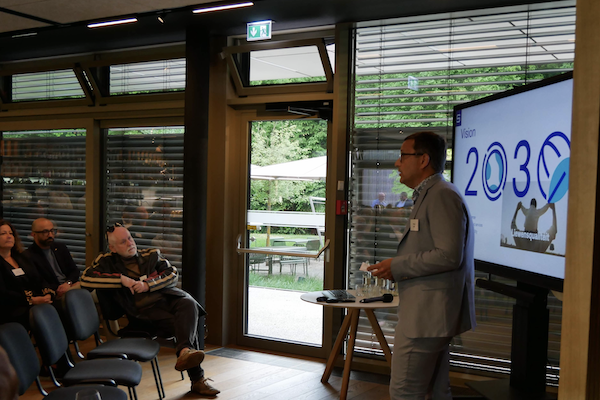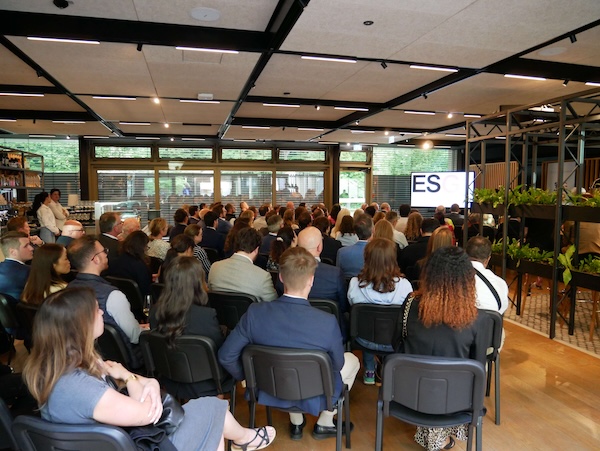 (L-R) Paul Schonenberg, Chairman and CEO of AMCHAM Luxembourg; Thierry Flies, CEO of Schroeder & Associés;
Credit: AMCHAM
(L-R) Paul Schonenberg, Chairman and CEO of AMCHAM Luxembourg; Thierry Flies, CEO of Schroeder & Associés;
Credit: AMCHAM
On Tuesday 13 May 2025, the American Chamber of Commerce in Luxembourg (AMCHAM) held its 2025 Spring Conference, entitled “Green Building Certifications: A Journey Towards a More Sustainable Built Environment,” at the headquarters of Schroeder & Associés in Kockelscheuer.
The event brought together over 100 professionals from Luxembourg's real estate and construction sectors to exchange insights on sustainability trends, with presentations highlighting real-world applications and benefits of green and healthy building certifications such as WELL and Fitwel.
In his opening speech, Paul Schonenberg, Chairman and CEO of AMCHAM Luxembourg, highlighted the proactive work of the chamber’s real estate committee, chaired by Mario Di Stefano, particularly in addressing Luxembourg’s housing challenges. He emphasised the need for affordable housing solutions for young professionals and university graduates, noting current regulatory limitations on minimum apartment sizes and the economic impracticality of existing models. Mr Schonenberg also referenced AMCHAM’s recent engagement with the government on this issue, including a letter to the Prime Minister, and expressed optimism about potential pilot projects in collaboration with Luxembourg’s Fonds du Logement (Housing Fund).
During the conference, Thierry Flies, CEO of Schroeder & Associés, shared insights into the company’s long-standing commitment to sustainability. He explained that Schroeder’s transformation strategy, launched over a decade ago, led to the creation of its certified sustainable headquarters — the venue for the event — which reflects the firm’s values of transparency, collaboration and innovation. Thierry Flies emphasised that this space was designed to support employee wellbeing and meet the highest environmental standards. Looking ahead, he outlined the company’s 2030 ambition to become a reference in integrated engineering and consultancy, with sustainability and lifecycle thinking embedded across all projects.
Francesca Pogliani, Sustainability Senior Manager at PwC, emphasised that “green certifications today are a pillar of ESG strategy and are fundamental to demonstrating real sustainability.” In her presentation, she offered an overview of environmental, social and governance (ESG) as a framework for evaluating sustainable practices in the real estate sector, underlining its growing relevance for investors, tenants and regulators. Ms Pogliani highlighted how sustainable buildings contribute to wellbeing, transparency and higher asset value, while also requiring measurable criteria that go beyond basic regulation. She explained the role of voluntary certifications such as BREEAM, WELL, HQE and DGNB, and noted that PwC has been involved in certifying over half of Luxembourg’s certified buildings, including the first Fitwel Platinum project in the country.
Continuing the presentation, Philippe Genot, Executive Manager of Schroeder & Associés, remarked: “The goal is not just certification — it’s about creating better buildings for people and the planet.” He outlined the technical efforts behind the firm’s sustainable headquarters, certified under the German DGNB Gold standard, highlighting that it meets equivalent performance to more widely known systems. Philippe Genot shared examples of engineering studies supporting the building’s sustainability, including rainwater management, energy efficiency, lifecycle and cost assessments of materials, and biodiversity protection. He also presented a pilot Greywater Reuse concept with national potential and emphasised that sustainable transport and resource efficiency are increasingly central to Schroeder’s projects, stating the importance of moving “from strategy to action — and delivering real results.”
Kira Golenko, CEO and Founder of Motko, highlighted how the real estate industry is evolving beyond traditional green certifications towards a stronger focus on health and wellbeing. “Would you not pay a premium for a home where the air you breathe helps your parents live longer or the light in your bedroom improves your sleep?” she asked the audience, framing wellness as a growing value driver in competitive markets. Kira Golenko traced the origins of green buildings to early resource efficiency efforts, but noted that as certifications became widespread, real estate stakeholders began seeking new ways to differentiate their assets, particularly through occupant experience and health. She discussed how the COVID-19 pandemic significantly accelerated the demand for healthy buildings and wellness certifications such as WELL and Fitwel, especially in markets facing vacancy pressures or ageing building stock. While acknowledging the value of certifications, she concluded that “true value creation comes from embedding health and wellness strategies that serve both people and performance — not just ticking boxes.”
The conference concluded with a networking BBQ and drinks.










